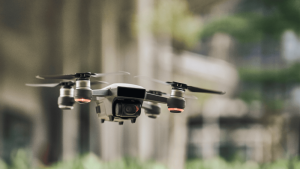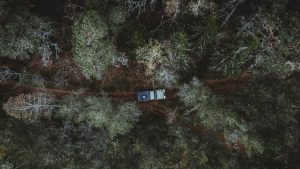In the world of technology and innovation, drones have become essential tools in many sectors with multiple applications, offering unique perspectives and efficient solutions to complex problems. If you want to know how to work with drones, you’ve come to the right place. Here you will find out how to become a professional in the field. But if you need personalized advice or help at any step, please contact us.
What does it take to work with drones?
Working with drones goes beyond simply knowing how to operate these unmanned aircraft. It is a sector that requires specific skills and in-depth knowledge of the technology, as well as certification as a drone pilot to certify your ability to operate under different circumstances and technical knowledge in certain areas.
In Spain, the State Aviation Safety Agency (AESA) is the body in charge of air safety and regulating this activity. Depending on the level of complexity and the type of operations you wish to perform, you will need to be specifically trained and obtain a certificate issued by AESA, training entities, an ATO or Ultralight Schools.
In addition, you need to have the right drone for the activity you want to carry out. Not all drones are the same, and having one that has the necessary technology for your sector and application is crucial.
All this will open the doors to professional development in this sector, allowing you to undertake projects and attract new clients.
What are the legal requirements for working with drones?
Complying with current legal regulations is essential to operate drones professionally and safely in Spain. Becoming a drone pilot with the necessary certificates and registering as a UAS operator with AESA are just the first steps. In addition, it is necessary to have a series of documents to operate drones and meet certain requirements:
- Operations Manual: This document details all aerial activities you will perform with your drones. It is essential only for operations that have to be conducted in STS Specific Category under standard scenarios or under the Operational Authorization regime.
- Operational Risk Assessment and Mitigation (ORA): Must be coordinated with the air traffic service provider (ATSP) of the flight area to ensure safe operations.
- Civil Liability Insurance: Protects against damages to third parties that may arise during drone operations.
- AESA Authorization: Necessary to fly under Conditions of Operation (CONOP) that cannot be performed or do not fit into the Open Category or Specific Category under standard scenarios, always depending on the activity to be performed.
- Compliance with Drone Regulations: Keeping up to date with current laws and regulations is imperative to avoid legal mishaps.
At UAS Group we understand that regulations and technical requirements can be very tedious and overwhelming. That is why we offer personalised support and advice at all stages of the process. Do not hesitate to contact us.
Drone pilots jobs
The universe ofopportunities for drone pilots is wide and diverse, spanning a variety of sectors and applications. Some of the sectors where the contribution of drones is not only valuable but revolutionary are:
Inspection of electrical lines and supports
The Regulation on Technical Conditions and Safety Guarantees in Power Plants, Substations and Transformer Substations, approved by R.D. 337/2014 of 9 May, requires a review every three years of the state of electrical infrastructures. Drones, equipped with the appropriate technology and specialized software, offer amore efficient and economical alternative to traditional methods, improving reliability and safety, and reducing inspection costs and times.
Wind turbine maintenance
The wear and tear of wind turbines, caused by adverse weather conditions and continuous operation, presents a significant challenge. Drones facilitate quick and accurate identification of cracks, structural stresses, rust and wear of parts, minimizing downtime and optimizing maintenance costs.
Monitoring of photovoltaic farms
The use of drones in PV farms improves the efficiency of commissioning, preventive maintenance and scheduled inspections. These operations not only reduce time and costs, but also enable the generation of detailed technical reports that provide customers and maintenance teams with accurate data on system efficiency and problem areas.
Civil engineering and photogrammetry
In the construction sector, drones are key tools for the supervision, monitoring and control of construction sites. Photogrammetry, for example, makes it possible to obtain digital terrain models and orthophotos for real-time monitoring of project progress, as well as 3D reconstruction of objects or surfaces using specialized software.
Precision farming
Precision agriculture benefits enormously from data obtained by drones and multispectral cameras, which help to optimize crop yields, manage water efficiently, detect pests early and monitor crop condition, among others. The advantages of using drones in this field are wide-ranging, such as the spatial accuracy of the data or the efficient management of resources.
Knowing how to work with drones opens up a world of possibilities. The diversity of applications for drone pilots is testimony to the versatility and added value that these devices bring to different sectors. If you want to make your way in this sector, do not hesitate to contact us.



